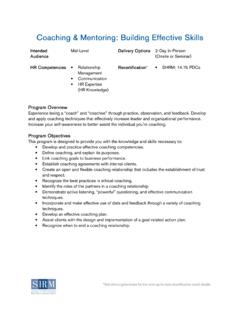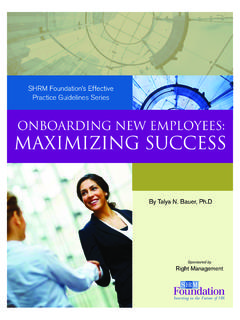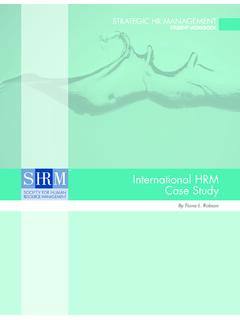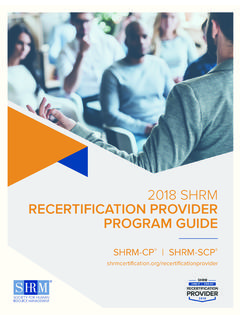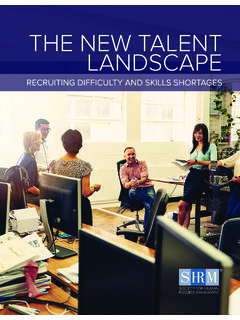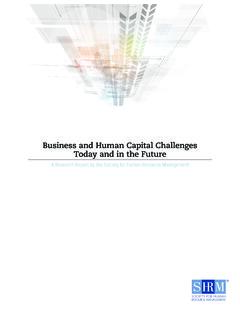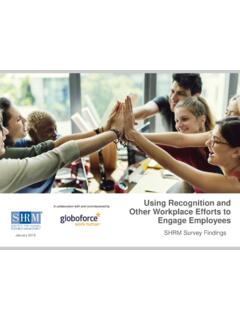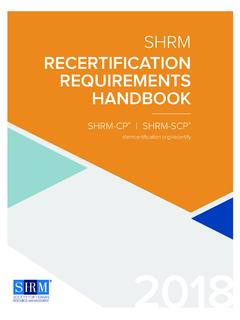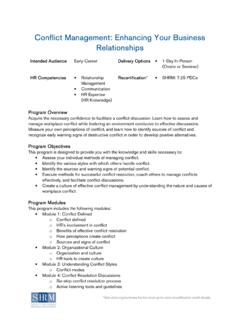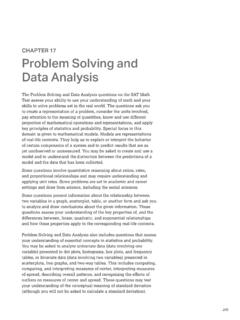Transcription of THE GLOBAL SKILLS SHORTAGE - SHRM
1 THE GLOBAL SKILLS SHORTAGEB ridging the Talent Gap with Education, Training and SourcingEmployment-Based Immigration 2018 I 1 The SKILLS Gap 2019 I 2 SHRM: Better Workplaces. Better United States is facing a growing SKILLS gap that threatens the nation s long-term economic prosperity. The workforce simply does not have enough workers and skilled candidates to fill an ever-increasing number of high-skilled million jobs were open in December 2018, but only million unemployed people were looking for work. As the country nears full employment, businesses face an even greater talent SHORTAGE that will have a stifling impact on the economy and GLOBAL and HR leaders view the SKILLS SHORTAGE as a top concern that needs to be addressed. Among HR professionals, 75% of those having recruiting difficulty say there is a SHORTAGE of SKILLS in candidates for job now, little has been known about how businesses are addressing the SKILLS gap or whether there are effective research shows that employers are making efforts.
2 They are investing in employee training, hiring from more diverse pools of talent and collaborating with educational they also say more progress is urgently SKILLS gap presents HR professionals with an opportunity to better understand the needs of their organizations and strategize will require increasing worker training and education, closely collaborating with educational institutions to improve graduate employability, and supplementing the existing workforce with foreign-born study described in this report begins the exploration of the SKILLS gap. To supplement these preliminary findings, SHRM will be conducting robust additional studies in 2019 and SKILLS Gap 2019 I 3 SHRM: Better Workplaces. Better A TIGHT TALENT MARKET WITH LOW UNEMPLOYMENT AND HIGH COMPETITION, TALENT ACQUISITION IS GETTING MORE DIFFICULTTOP REASONS ORGANIZATIONS ARE STRUGGLING TO HIRE SUITABLE CANDIDATES43%36%35%30%Competition from other employersCandidates do not have the needed work experienceCandidates do not have the right technical skills32%Salaries and benefits are not competitive for the market33%Low number of applicants or lack of interest in the organizationCandidates do not have the right workplace (soft) skills83%OF RESPONDENTS HAVE HAD TROUBLE RECRUITING SUITABLE CANDIDATES IN THE PAST 12 one-third report a decrease in applicant quality across the board, and 45% report a decrease in quality for specific SKILLS Gap 2019 I 4 SHRM: Better Workplaces.
3 Better 3 MISSING SOFT SKILLSSO WHAT SKILLS ARE MISSING?TOP 3 MISSING TECHNICAL SKILLS75%OF THOSE HAVING DIFFICULTY RECRUITING BELIEVE THERE IS A SKILLS SHORTAGE AMONG THEIR APPLICANTS. However, some SKILLS are more frequently reported as being missing than others. Generally, respondents feel that applicants lack technical SKILLS (those associated with specific knowledge and training) more so than workplace or soft SKILLS that are necessary regardless of industry or job SKILLS gap isn t going away or fixing itself over 50% of respondents feel that SKILLS shortages have worsened or greatly worsened in their organizations in the last two years. Less than 10% of respondents report SKILLS SHORTAGE SKILLS (Carpentry, plumbing, welding, machining, etc.)DATA ANALYSIS/DATA SCIENCESCIENCE/ENGINEERING/MEDICALPROBLE M solving , CRITICAL THINKING, INNOVATION AND CREATIVITYABILITY TO DEAL WITH COMPLEXITY AND AMBIGUITYCOMMUNICATION31%20%18%37%32%31% The SKILLS Gap 2019 I 5 SHRM: Better Workplaces.
4 Better World. Providing onsite training to employees ( , seminars, training programs) Starting/expanding training programs to help improve SKILLS of new hires Hiring external workforce ( , temps, independent contractors) Increasing compensation Improving retention efforts for current employees Expanding advertising efforts ( , using social media, expanding search regions) Collaborating with educational institutions to build talent pipelines Outsourcing recruiting efforts ( , using a third-party staffing agency) Training internal employees to take on hard-to-fill positions Increasing compensation Improving retention efforts for current employees MOST EFFECTIVE REMEDIESMOST COMMON REMEDIESHOW ORGANIZATIONS ARE BRIDGING THE SKILLS GAPMany organizations are taking steps to address the SKILLS gap and maintain a high-quality workforce, but are they taking the right steps? Not every remedy to the SKILLS SHORTAGE is effective, and even those that are highly effective for some positions aren t right for all difficult-to-fill positions.
5 While not appropriate for every organization or position, some employers find alternative candidate sources an effective remedy, including:FOREIGN COUNTRIES VETERANS RETIREES FORMERLY INCARCERATEDThe SKILLS Gap 2019 I 6 SHRM: Better Workplaces. Better depends who you ask:Industries like manufacturing and construction rely mostly on vocational education systems to provide workers with the SKILLS they like high-tech and professional/scientific/technical services rely mostly on higher education to develop their EDUCATION SYSTEM IS BEST POSITIONED TO ADDRESS THE SKILLS GAP? WHAT ELSE NEEDS TO BE DONE?Employers can t solve the SKILLS gap issue alone; they need support from education systems to build talent pools with SKILLS relevant to today s business needs. While some organizations have worked directly with education partners to build talent pipelines, most are reliant upon education systems identifying and developing the needed SKILLS of the future workforce on their on open-ended responses, HR professionals feel candidates are lacking some SKILLS that are shared by all education systems:PROFESSIONALISMCRITICAL THINKINGLIFELONG LEARNINGBUSINESS ACUMEN51%OF RESPONDENTS SAY EDUCATION SYSTEMS HAVE DONE LITTLE OR NOTHING TO HELP ADDRESS THE SKILLS SHORTAGE work needs to be done by organizations and education systems to ensure that the workforce is prepared for the future of work.
6 The SKILLS Gap 2019 I 7 SHRM: Better Workplaces. Better TEAMT rent Burner, VP, Research Liz Supinski, Director, Data Science & ResearchSusan Zhu, Post-Doctoral Research FellowSamuel Robinson, Survey Design LeadCate Supinski, Specialist, Strategic Research InitiativesThis report is published by SHRM the Society for Human Resource Management. All content is for informational purposes only and is not to be construed as a guaranteed outcome. SHRM cannot accept responsibility for any errors or omissions or any liability resulting from the use or misuse of any such information. 2019 Society for Human Resource Management. All rights reserved. Published in the United States of publication may not be reproduced, stored in a retrieval system or transmitted in whole or in part, in any form or by any means, electronic, mechanical, photocopying, recording or otherwise, without the prior written permission of the Society for Human Resource Management, 1800 Duke Street, Alexandria, VA 22314, more information, please contact:SHRM Research Department1800 Duke Street, Alexandria, VA 22314, USAP hone: (703) 548-3440 Email: thousand SHRM Society for Human Resource Management members were invited by e-mail to participate in this survey, which was fielded September 12-26, 2018.
7 Of those, 1,028 participated, yielding a response rate of approximately 5%. The number of respondents varies from one finding to another as some respondents did not answer all of the questions. Individuals may not have responded to a question on the survey because the question or some of its parts were not applicable or because they did not know the answer, thus the varying number of responses to different items. As with any research, readers should exercise caution when generalizing results and should take individual circumstances and experiences into consideration when making decisions based on these data. Although SHRM is confident in its research, it is prudent to understand that the results presented in this survey report are only truly representative of the sample of HR professionals responding to the NOTE19-0017
